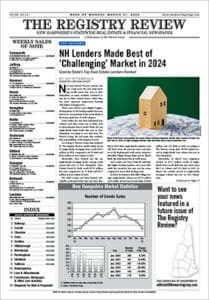
Numbers of new listings are down year-over-year, and likely to fall further. But looming restrictions on mortgage availability could turn the tables on sellers.
The coronavirus pandemic has thrown the state real estate market for a loop, as social distancing measures have raised questions about how active the market will be and what it will look like in coming months.
During a recent Zoom conference hosted by the New Hampshire Association of Realtors, real estate brokers across New Hampshire said while homes are still selling, lots of sellers have removed listings from what was already a limited supply of inventory.
However, brokers also said that both buyers and sellers are raring to get back to normal – whatever that may look like once the virus subsides – which could lead to new market dynamics.
“If you’re a buyer in this environment and you feel comfortable in your employment situation, with interest rates so low… this is a pretty good time to buy,” said Chris Masiello, president and CEO of Southern New Hampshire’s The Masiello Group. “Inventory is thin, but that will probably thicken out once we get back into some normalcy. Our summer market might be in October, or we might have a banner January.”
What’s Happened So Far
Considering the virus really didn’t hit the economy until early to mid–March, Realtors have not seen a huge impact yet.
In the 48 hours before the panel on April 10, Bill Weidacher, a founding partner of the Bedford-based Fine Homes Group of Keller Williams Realty Metropolitan, said his company listed 119 properties for sale and 118 of those are already under contract.
“If I’m a buyer and I’m serious [about buying a home], I see an opportunity in that there may be less competition,” he said.
Brenda Leavitt, managing partner at Berlin-based Badger Realty, said she was surprised to find that 70 percent of her firm’s recent new sales were completed after Feb. 15.
New listings in March were down almost 7 percent year-over-year, while available homes for sale are down more than 25 percent year-over-year, but sales have remained relatively steady, participants in the call said.
One reason, according to Masiello, is because pipelines of pending sales were as big as they had ever been prior to the virus’ arrival, and despite social distancing, most sales have been closing even if the process looks different.
Stakeholders in the homebuying process have had to get creative. Buyers are closing in parking lots, Realtors are doing electronic closings and virtual tours and appraisers are using photography and data from the multiple listing service to conduct their appraisal reports.
Shifting to a Buyer’s Market?
It’s hard to say where the market will head because there are so many unknowns.
“We are really going to know where things sugar out in the next 60 days,” said Weidacher. “Unemployment numbers continue to trickle in every single Thursday and each week we are getting hardened to these large numbers. Somewhere along the line it is going to have an effect if it hasn’t had one already.”
“None of us really know what a 20 percent unemployment number looks like,” added Masiello.
Leavitt, who sells many second homs, said she still sees conditions in that market as closer to a seller’s market because inventory is down 35 to 40 percent year-over-year, and properties are still receiving multiple offers.
“We would be doing much better if we had property to sell,” she said.
However, Leavitt also said in the company’s Maine business, where more people are buying primary homes, the market has certainly slowed because people have lost jobs.
Masiello said many people currently looking to sell their homes are putting those efforts on pause right now because of the virus. That, coupled with statewide data that shows listings are down, suggests a buyers market could emerge if that inventory resurfaces.
Masiello said he would not be surprised to see a two-, three- or four-week period where there is a buyer’s market in certain pockets of New Hampshire, although it will likely toggle back and forth between a buyer’s and seller’s market.
Additionally, JPMorgan Chase, the country’s largest bank, recently said that it will tighten lending standards on new home loans, requiring most new borrowers to have a credit score of 700 or above and make a 20 percent down payment.
If other banks follow suit, that could take many potential buyers out of the market, perhaps even enough to create a buyer’s market.

